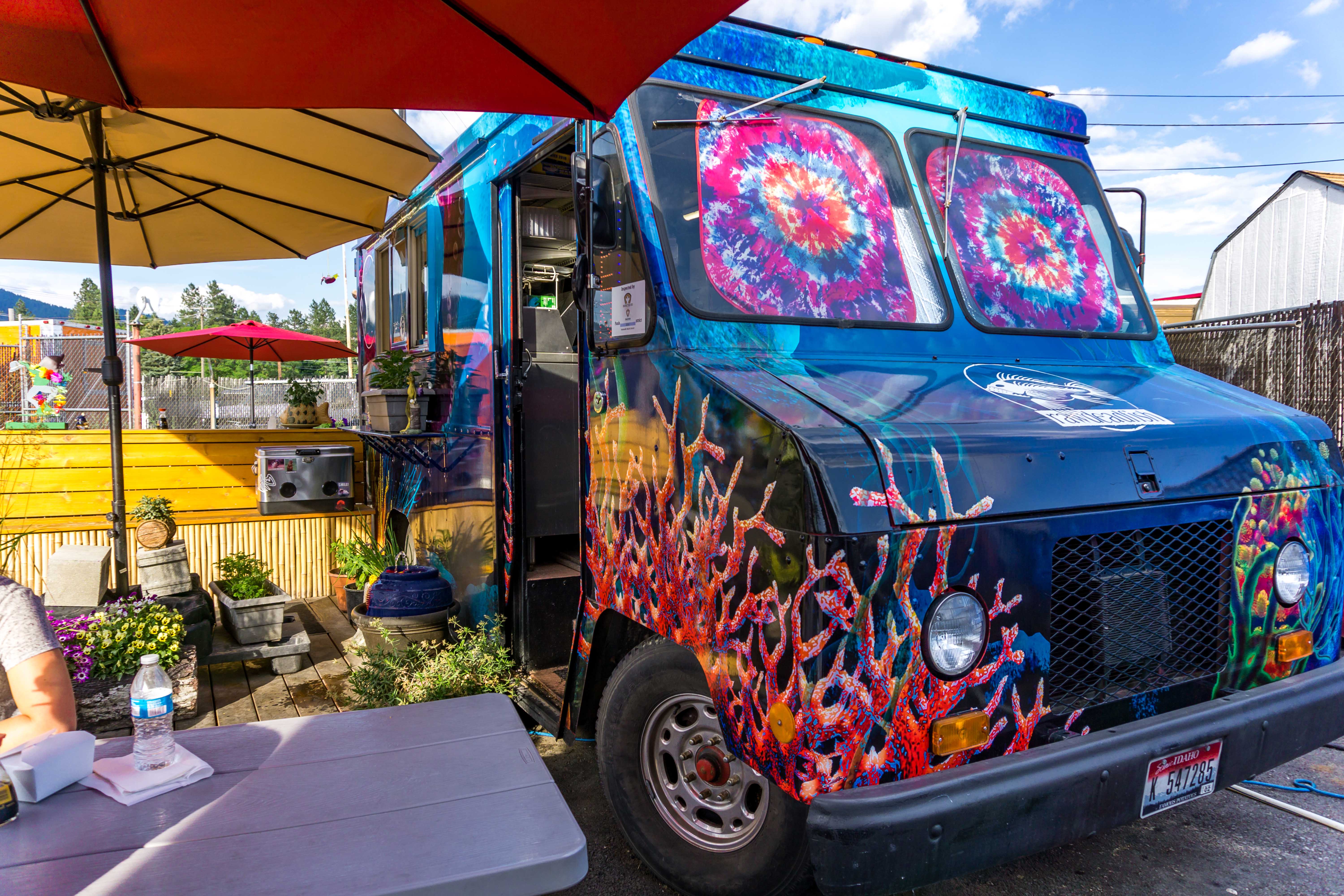Food Trucks Add to Growing Culinary Scene
By Colin Anderson | Article provided by Coeur d’Alene Living Local
One of the guilty pleasures of attending the state, county or regional fair is gorging one’s self on all the deliciously sinful fair food. Deep fried everything, sugar-blasted batter and just about anything on a stick, all treats we allow ourselves during the annual evening out. These foods are highly processed and usually concocted in a stand, trailer or truck, and although delicious, one wouldn’t want to subsist on these foods on a regular basis. The stigma that food prepared outside of a traditional restaurant setting is unhealthy, unsafe and only consumed on certain occasions is something today’s food-truck operators continue to battle.
“One of the most common misconceptions of food trucks is that we are dirty and have limited sources,” explained Travis Whiteside, owner of Rawdeadfish food truck in Coeur d’Alene. “We have to pass the same strict laws and regulations as any other restaurant. The health department comes and checks everything the same as any other business.”
Travis is part of a growing movement of former restaurant workers, chefs and owners who are ditching the traditional brick-and-mortar model in favor of the mobility of a food truck. Rawdeadfish is one of several trucks you’ll find at the Best on Best Food Court located just east of Fourth Street. While he’s been open for more than three years and always able to move, Travis says he’s found a solid home and following of customers who’ve embraced the idea that great food doesn’t always have to come from a traditional restaurant kitchen.
“We had a lot of skeptical people at first, and it seemed like most of the new customers would order one item just to see. They would return minutes later and order much more. It seemed like we passed the test,” he said.
A sushi chef and restaurateur for more than 25 years, Travis has seen the difficulties in opening restaurants and maintaining quality in both food and service to the customers. Operating Rawdeadfish allows him much more control over every aspect of the business.
“In a larger kitchen, there are more people or cooks involved in the product. This can lead to inconsistency and more waste. The less hands involved means the less chance for error,” he said.
It’s a similar story a few blocks up Government Way where Daryl Kunzi is owner, pitmaster, cashier and dishwasher at Drummin up BBQ (which can be found adjacent to Lloyd’s Automotive), which also handles catering events all over town. Seven years ago, Daryl turned his hobby and passion for pit-style barbecue into his first restaurant, which was located in South Dakota. He quickly realized that running a full-scale restaurant was a monumental task.
“My equipment was subpar for running a restaurant; I had to tend the pits all night and was serving in the restaurant all day. I averaged four very broken hours of sleep a night, which was not a very healthy lifestyle,” recalled Daryl.
After a one-year break from the restaurant industry, Daryl was inspired to look at a smaller operation where he had more control of his product. He believes his current setup allows for the best presentation, quality and experience for those seeking high-quality barbecue.
“With the small footprint, it allows me to prepare food and also interact with the customers. It gives me a chance to get to know them and their names,” he said.
The greater Sandpoint area is also seeing a growing number of food trucks serving local business professionals and visitors alike. Tacos Tacos sees consistent traffic for both breakfast and lunch with some of the best and most affordable Mexican cuisine in the area. Traditional Hawaiian dishes like Loco Moco, Poke’ and Kalua Pork are served up from the Ponderay Aloha Grill. The Oak Street Food Court offers a wide selection of choices from café-style bites to Thai and barbecue selections, all with adjacent outdoor casual communal seating.
One of the first areas to truly embrace food truck culture was Portland, Oregon. The city’s Alder Street Food Court goes back more than two decades and is a block in the heart of downtown filled with food carts offering an unbelievable variety of choices. As the culture has exploded, there are new ‘pods’ of food trucks settling all over town, anywhere from a couple trucks to several dozen with their own designations such as Cartlandia, Rose City Food Park, Good Food Here and Q19. In fact, there are now more than 500 food trucks operating within city limits. The trend is also present in Seattle where space is at a premium and the demand for high-quality food is at an all-time high. As more and more residents, both young and old, move out of these densely populated areas and find new homes in North Idaho, their ideas and experiences come with them.
While North Idaho will likely never approach a population to support so many trucks, owners feel the ‘pod’ setup like the Best on Best and Oak Street food courts could definitely work here too, provided operators are able to work with cities and counties.
“The biggest area of growth that I see in the food truck business is a few more food truck courts. I know of a few trucks that are having a hard time finding permanent spots that meet city ordinance requirements,” said Daryl.
While on the surface opening a food truck might sound easier, it can be just as much work for the owners, and the perils of off-seasons and accidents come with the territory as well. An electrical fire wiped out Rawdeadfish for a three-month period, something the truck is still recovering from months later.
“It was hard to get back into people’s thoughts after being shut down for so long. Some people still ask us when we reopened from the fire,” said Travis.
Winter is also a meager time as most customers aren’t going to sit outside on a bench in freezing weather, and getting to the truck can be an adventure on snowy and icy roads as well.
“People ask, ‘What do you do in the wintertime?’ Well we’ve got to get the snow gear out and clear snow!” laughed Daryl.
During the summer, it’s not uncommon for operators to work 80 to 100-hour weeks capitalizing on the influx of visitors, nice weather, graduations, family reunions, weddings and more. The dedication to providing high-quality meals to consumers on the go is what helps the best of the best stick around.
So why wait for the fair to roll around to visit a food truck? Stop by for a bite and taste firsthand the incredible dishes coming from a place you might have never considered.


